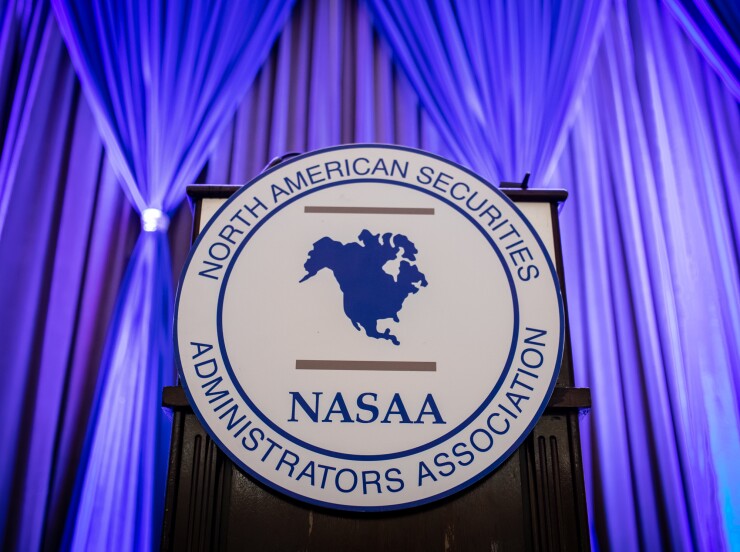The pandemic that had most of the country quarantining at home in 2020 also shuttered courts and sent state securities regulators to work in their bedrooms and basements just like their constituents. But they continued hunting down fraudsters, the
“NASAA members are the first line of defense protecting investors from financial fraud,” said Melanie Senter Lubin, president of NASAA and Maryland’s securities commissioner, in announcing the report’s findings.
State regulators launched 5,501 new investigations in 2020, for a total of 8,073, leading to 2,202 enforcement actions last year. That’s down from 6,525 new investigations in 2019, leading to 2,755 enforcement actions that year, but roughly on par with regulators’ 2018 activity.
Of the enforcement actions in 2020, the vast majority were administrative in nature, with only 206 moving on to criminal charges and 116 becoming civil lawsuits.
The agencies took particular aim at financial advisors and their firms this year. State regulators moved against “497 registered parties, including 153 investment advisers, 115 investment adviser representatives, 110 broker-dealer firms and 119 broker-dealer agents,” the report noted, as well as 619 actions against “unregistered parties.”
The state regulators were able to recover $306 million in investor funds, as well as imposing an additional $42 million of fines in 2020, the report showed.
The largest number of enforcement actions this year related to promissory notes (“no surprise here,” said Alabama Securities Commission Director Joseph Borg, co-chair of the NASAA Enforcement Section), followed by stocks and equities, internet and social media, real estate, and commodities and precious metals.
“The list represents the tip of the iceberg when it comes to the many ways that honest investors are separated from their money through dishonest means,” said Texas Enforcement Director Joseph Rotunda, vice chair of the NASAA Enforcement Section.
An area of emerging concern this year was frauds related to the pandemic, including con artists raising investor funds for phony COVID cures and other schemes, Borg said.
“We actively went out and looked for these scams before they impacted a lot of folks,” Borg said. “We were trying to be proactive rather than reactive to a greater extent.”
Despite the pandemic, regulators continued to receive documents electronically related to complaints, and workers were able to analyze records from their home offices, Borg said. But with many courts closed or working under capacity constraints due to quarantine rules, not as many cases moved from regulators’ desks to courtrooms, which will likely affect next year’s tallies related to criminal and civil proceedings.
“I have a dozen or so criminal trials that are backed up, so that will affect my numbers next year,” he said.
An ongoing problem for state regulators is fraud against senior citizens. NASAA’s Model Act to Protect Vulnerable Adults from Financial Exploitation, versions of which are in force in 32 states, makes financial professionals mandatory reporters who must call the authorities if they suspect an elderly client is being abused.
But despite the increasing prevalence of these rules, the fraud tallies include a large number of seniors who were swept up in scams, Borg said.
“While they may not have been a major product failure or something along the lines of a large case we saw in the past, like auction rate securities, the numbers are small but they do turn out to be significant,” he said. “It all has an impact on that particular investor.”
There were also fraud hotspots around the country related to cryptocurrency and blockchain, as well as cybersecurity, private securities offerings and self-directed IRAs, the report showed.
“States reported a tripling of enforcement actions involving digital assets,” Rotunda said.
The report is a snapshot of a country rife with securities scams, many of which flourished when COVID drove investors to panic over the state of their retirement funds and life savings, sending them into the arms of get-rich-quick scamsters. While the SEC and FINRA oversee the nationally registered firms and advisors, smaller and more local businesses fall to the states.
“I think it’s impressive that NASAA was able to continue with a meaningful level of investigation and enforcement even during the pandemic,” said Chris DiTata, vice president and general counsel of New York City-based compliance outsourcer RIA in a Box.
For advisors who want to ward off zealous regulators, DiTata recommends frequently revising their firm’s compliance manuals as the rules change. In addition to subscribing to compliance newsletters and reading state-level and NASAA press releases to keep up with regulatory updates, he suggests that firms focus on emerging problems, such as implementing a client trusted-contact form to fight fraud against seniors, or training staff and clients to recognize cybersecurity risks.
“The culture of emphasizing compliance has continued to increase over the last few years,” DiTata said. “It’s continuing to head in the right direction.”







